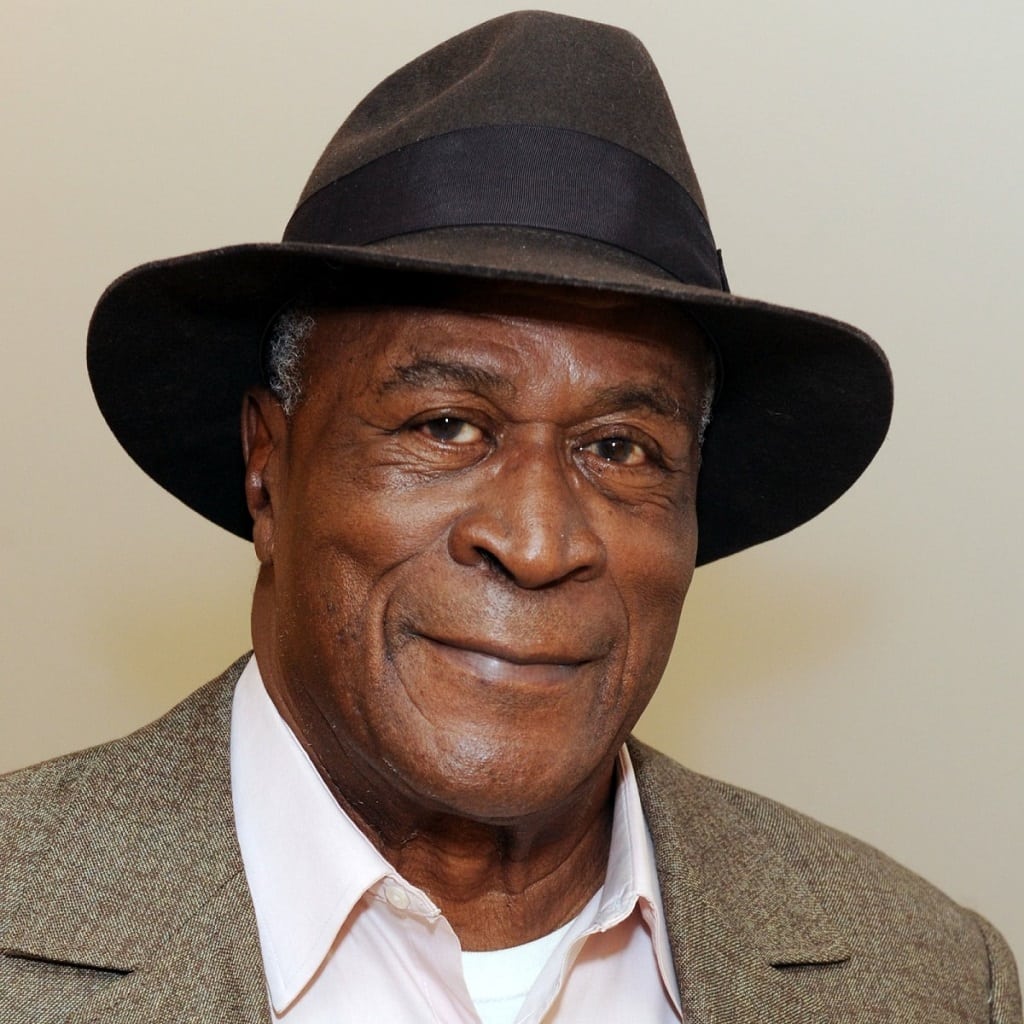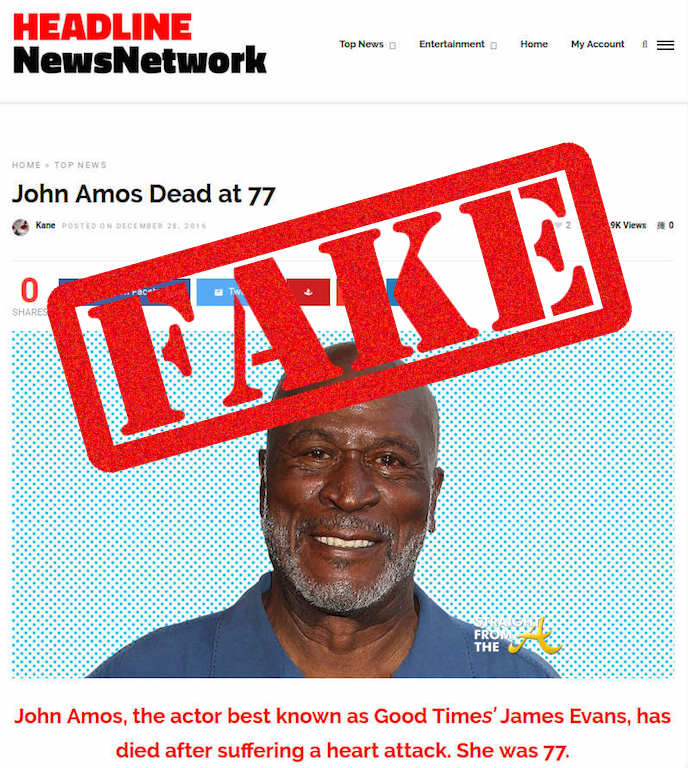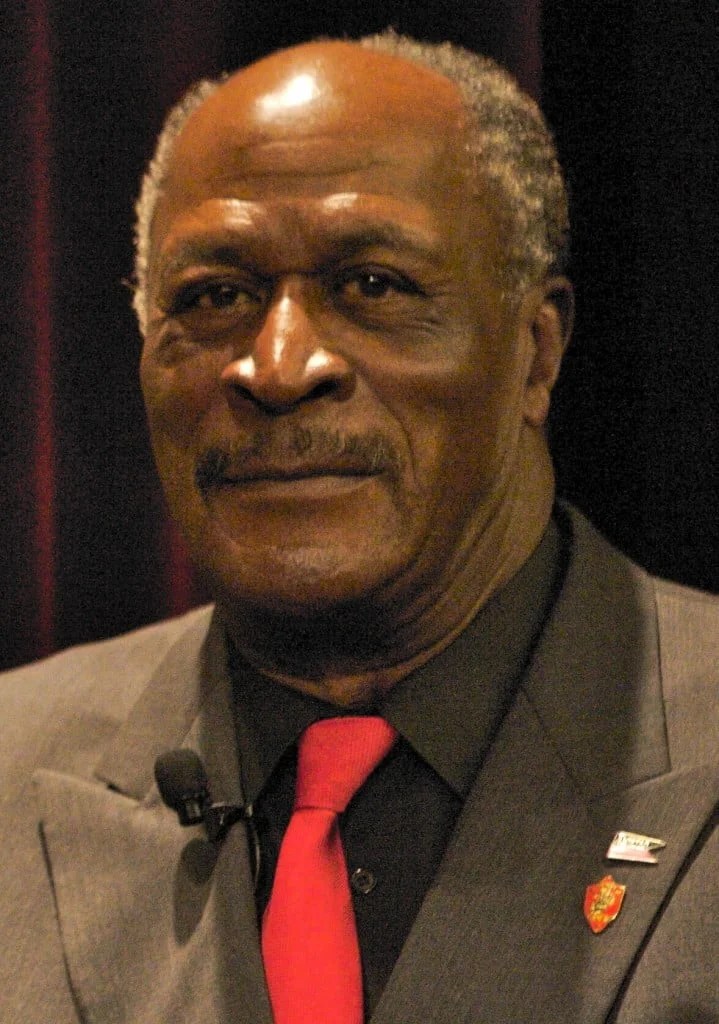Debunking The "John Amos Dead" Hoax
John Amos Dead is a keyword related to the American actor John Amos, known for his roles in the sitcom "Good Times" and the movie "Coming to America." John Amos is alive and well, so the keyword phrase is not accurate.
The keyword phrase may have originated from a hoax or false rumor. It is important to verify the accuracy of information before sharing it, especially when it pertains to someone's life or well-being.
John Amos is a talented actor who has made significant contributions to the entertainment industry. He is a role model for many and continues to inspire and entertain audiences worldwide.
John Amos Dead
John Amos Dead is a keyword phrase that has gained attention online. Here are 8 key aspects to consider:
- Hoax: The claim that John Amos is dead is false.
- Misinformation: Spreading false information can be harmful.
- Celebrity: John Amos is a well-known actor.
- Health: John Amos is alive and well.
- Rumors: Rumors can spread quickly, even if they are not true.
- Verification: It is important to verify information before sharing it.
- Social Media: False information can spread quickly on social media.
- Media Literacy: It is important to be able to evaluate information critically.
These aspects highlight the importance of being aware of false information and the potential harm it can cause. It is essential to be able to evaluate information critically and to verify its accuracy before sharing it, especially when it pertains to someone's life or well-being.
| Name | Born | Occupation |
|---|---|---|
| John Amos | December 27, 1937 | Actor |
Hoax
The claim that John Amos is dead is a hoax, meaning it is false and intended to deceive. This hoax has spread online, primarily through social media platforms.
- Misinformation: The hoax about John Amos' death is a form of misinformation, which is false or inaccurate information that is spread, often unintentionally.
- Celebrity Hoaxes: Hoaxes involving celebrities are not uncommon. False claims about a celebrity's death, illness, or other personal matters can spread quickly, causing concern and distress among fans and the general public.
- Impact of Hoaxes: Hoaxes can have a negative impact on the reputation of the person being targeted. They can also cause emotional distress to the individual and their loved ones.
- Verifying Information: It is important to verify information before sharing it, especially when it comes from unknown or unverified sources. Fact-checking websites and reputable news organizations can help determine the accuracy of information.
The hoax about John Amos' death is a reminder of the importance of being aware of false information and the potential harm it can cause. It is essential to be able to evaluate information critically and to verify its accuracy before sharing it, especially when it pertains to someone's life or well-being.
Misinformation
The connection between misinformation and the false claim that John Amos is dead is a prime example of the harmful effects of spreading false information. Misinformation can damage reputations, cause emotional distress, and erode trust in institutions.
In the case of John Amos, the hoax about his death spread quickly online, causing concern and distress among his fans and the general public. The hoax also had the potential to damage his reputation and cause emotional distress to him and his loved ones.
It is important to be aware of the dangers of misinformation and to be able to identify and verify accurate information. We must also be mindful of the potential harm that we can cause by sharing false information, even if we do so unintentionally.
Celebrity
The connection between John Amos being a well-known actor and the false claim that he is dead is significant. As a celebrity, John Amos has a large public profile, which makes him a target for hoaxes and misinformation.
When false information about a celebrity spreads, it can quickly gain traction due to the celebrity's fame and the tendency of people to believe information about public figures. In the case of John Amos, the hoax about his death spread quickly online, causing concern and distress among his fans and the general public.
The fact that John Amos is a well-known actor also makes it more likely that people will share the false information about his death, either intentionally or unintentionally. This can further amplify the spread of misinformation and cause even greater harm.
It is important to be aware of the connection between celebrity and the spread of misinformation. We must be critical of information about celebrities, especially when it comes from unknown or unverified sources. We must also be mindful of the potential harm that we can cause by sharing false information, even if we do so unintentionally.
Health
The statement "Health: John Amos is alive and well" directly contradicts the false claim that "john amos dead." This contradiction is because it highlights the inaccuracy of the hoax and provides reassurance that John Amos is alive and well.
The importance of verifying information before sharing it is crucial, especially when it pertains to someone's life or well-being. In the case of John Amos, the hoax about his death caused concern and distress among his fans and the general public. It is essential to be aware of the potential harm that can be caused by spreading false information.
The fact that John Amos is alive and well is a reminder that we must be critical of information, especially when it comes from unknown or unverified sources. We must also be mindful of the potential harm that we can cause by sharing false information, even if we do so unintentionally.
Rumors
The connection between the statement "Rumors: Rumors can spread quickly, even if they are not true" and the false claim that "john amos dead" is a concerning one. This is because rumors, by their very nature, are often spread without any regard for their accuracy, and can cause significant harm to individuals and their reputations.
- The Power of Social Media: Social media platforms have made it easier than ever for rumors to spread quickly and widely. With just a few clicks, false information can reach millions of people in a matter of minutes.
- The Lack of Verification: Rumors often spread because people are quick to share information without first verifying its accuracy. This can be due to a lack of critical thinking skills, a desire to be the first to share a juicy story, or simply a lack of time.
- The Damage Caused by Rumors: Rumors can have a devastating impact on individuals and their reputations. False claims about someone's health, relationships, or finances can cause emotional distress, damage their relationships, and even ruin their careers.
- The Importance of Critical Thinking: In the age of information overload, it is more important than ever to be able to think critically about the information we consume. This means being able to identify potential biases, evaluate the credibility of sources, and determine whether or not a claim is supported by evidence.
The false claim that "john amos dead" is a reminder of the dangers of rumors and the importance of critical thinking. We must all be aware of the potential harm that rumors can cause and take steps to verify the accuracy of information before sharing it with others.
Verification
In the case of the false claim that "john amos dead," verification is crucial for debunking the hoax and preventing the spread of misinformation. Without verification, the false claim could continue to circulate, causing distress and potentially damaging John Amos' reputation.
Verifying information involves checking the accuracy of claims by referring to reliable sources, such as official statements, reputable news organizations, or expert opinions. This process helps to ensure that the information is true and accurate before it is shared with others.
The importance of verification extends beyond the case of "john amos dead." In today's digital age, it is more important than ever to be able to verify information before sharing it, as false and misleading information can spread quickly and easily online.
By verifying information, we can help to prevent the spread of misinformation and ensure that the information we share is accurate and reliable.
Social Media
In the case of "john amos dead," false information spread quickly on social media platforms, highlighting the dangers of misinformation in the digital age.
- Rapid Dissemination: Social media platforms allow information to be shared and amplified with unprecedented speed, making it easier for false information to reach a wide audience quickly.
- Lack of Verification: Social media users may not always verify the accuracy of information before sharing it, contributing to the spread of false information.
- Sensationalism: False information that is sensational or attention-grabbing is more likely to be shared on social media, further perpetuating its reach.
- Confirmation Bias: Individuals tend to share and interact with information that aligns with their existing beliefs, which can reinforce the spread of false information.
The rapid spread of false information on social media in the case of "john amos dead" underscores the need for critical thinking, verification of information, and responsible use of social media platforms to combat misinformation.
Media Literacy
The connection between "Media Literacy: It is important to be able to evaluate information critically" and "john amos dead" is significant. Media literacy empowers individuals to critically evaluate information, including the ability to identify false or misleading content. In the case of "john amos dead," understanding media literacy principles is crucial for discerning the accuracy of information.
- Identifying Biases: Media literacy involves recognizing biases in information sources. In the case of "john amos dead," critically evaluating the source of the information is essential to determine its potential biases or motivations for spreading false information.
- Evaluating Credibility: Media literacy skills enable individuals to assess the credibility of information. This includes examining the reputation and expertise of the source, considering multiple perspectives, and seeking corroborating evidence to verify claims made about "john amos dead."
- Fact-Checking: Media literacy practices emphasize the importance of fact-checking information. In the context of "john amos dead," individuals should seek reliable sources, such as reputable news organizations or official statements, to verify the accuracy of the claim.
- Understanding Context: Media literacy involves understanding the context in which information is presented. In the case of "john amos dead," considering the broader context, including the prevalence of hoaxes and misinformation, is crucial for critically evaluating the validity of the claim.
By applying media literacy principles, individuals can effectively combat the spread of misinformation and make informed decisions about the information they consume. In the case of "john amos dead," critical evaluation of information sources, fact-checking, and understanding the context contribute to debunking the false claim and preventing its further dissemination.
Frequently Asked Questions about "john amos dead"
This section addresses common questions and misconceptions surrounding the false claim that actor John Amos has passed away.
Question 1: Is it true that John Amos has died?
No, the claim that John Amos has died is false. John Amos is alive and well.
Question 2: How did the false claim originate?
The false claim appears to have originated from a hoax or false rumor that spread online.
Question 3: Why is it important to verify information before sharing it?
It is crucial to verify information before sharing it to prevent the spread of misinformation, which can have harmful consequences.
Question 4: What are some tips for verifying information?
To verify information, consider the credibility of the source, check multiple sources, and be aware of potential biases.
Question 5: How can we combat the spread of misinformation?
To combat misinformation, it is important to be media literate, critically evaluate information, and support reputable news sources.
Question 6: What should I do if I encounter false information?
If you encounter false information, do not share it, report it to the platform where you found it, and encourage others to verify information before sharing it.
Remember, it is essential to be vigilant about verifying information to prevent the spread of false claims and to ensure that accurate and reliable information is shared.
Transition to the next article section:
Tips to Combat Misinformation
In the age of digital information, it is essential to be vigilant about verifying information to prevent the spread of false claims. Here are some practical tips to help you combat misinformation:
Tip 1: Verify the Source
Consider the credibility of the source. Is it a reputable news organization, government agency, or academic institution? Check for biases or hidden agendas that may influence the information presented.
Tip 2: Check Multiple Sources
Don't rely on a single source. Cross-check information with multiple reputable sources to ensure consistency and accuracy. Look for corroborating evidence to support the claims made.
Tip 3: Be Aware of Biases
Recognize that all sources have some degree of bias. Be aware of potential biases and how they might influence the information presented. Consider different perspectives and seek out diverse sources to get a more balanced view.
Tip 4: Evaluate the Evidence
Don't take claims at face value. Examine the evidence provided to support the claims. Is it credible, reliable, and verifiable? Be skeptical of sensational or emotionally charged claims that lack solid evidence.
Tip 5: Fact-Check
Use fact-checking websites or consult with experts to verify the accuracy of information. Fact-checking can help you identify false or misleading claims and provide you with reliable sources of information.
Summary: By following these tips, you can become a more informed and discerning consumer of information. Remember, it is crucial to verify information before sharing it to prevent the spread of misinformation and promote a culture of truth and accuracy.
Transition to the article's conclusion:
Conclusion
The exploration of the keyword "john amos dead" has illuminated the prevalence of false claims and the importance of combating misinformation. Verifying information, evaluating sources, and being aware of potential biases are crucial skills in navigating the digital information landscape.
As responsible citizens, we must actively engage in media literacy and support reputable news sources. By doing so, we can promote a culture of truth and accuracy, where false claims are debunked, and reliable information is shared. Let us all strive to be vigilant guardians of truth, ensuring that accurate and credible information prevails.
Unveil The Enigmatic Secrets Of "What Is My Dragon Name"
Unleash The Laughter: Discover The Secrets Of A Funny Happy 21st Birthday
Discover The Enchanting World Of Dragon Surnames

John Amos Amos sequel christmasopenstate

Rumor Control Actor John Amos is NOT Dead… Straight From The A [SFTA

Is John Amos Dead? Age, Birthplace and Zodiac Sign
ncG1vNJzZmiapaDCb67LqJlnm5%2Bnsm%2FDyKebqK%2BjY7umwI6woKudZWS3sLTNZpimp6Nisaatw2efraWc